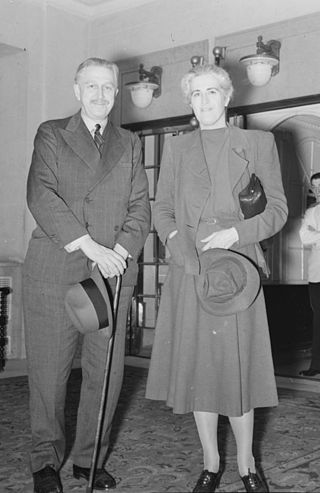
Fiona Juliet Stanley is an Australian epidemiologist noted for her public health work, her research into child and maternal health as well as birth disorders such as cerebral palsy. Stanley is the patron of the Telethon Kids Institute and a distinguished professorial fellow in the School of Paediatrics and Child Health at the University of Western Australia. From 1990 to December 2011 she was the founding director of Telethon Kids.

The Vanier Cup is a post season college football championship game, used to determine the national champion in U Sports football. The game is the final for the winners of the Uteck Bowl and the Mitchell Bowl. In turn, the participating teams are determined by the winners of 4 bowl games: the Loney Bowl (AUS), Hardy Cup, Dunsmore Cup (RSEQ), and Yates Cup (OUA).

The University of Roehampton, London, formerly Roehampton Institute of Higher Education, is a public university in the United Kingdom, situated on three major sites in Roehampton, in the London Borough of Wandsworth. The University traces its roots to four institutions founded in the 19th century, which today make up the university's constituent colleges, around which student accommodation is centred: Digby Stuart College, Froebel College, Southlands College and Whitelands College.

Communication studies or communication science is an academic discipline that deals with processes of human communication and behavior, patterns of communication in interpersonal relationships, social interactions and communication in different cultures. Communication is commonly defined as giving, receiving or exchanging ideas, information, signals or messages through appropriate media, enabling individuals or groups to persuade, to seek information, to give information or to express emotions effectively. Communication studies is a social science that uses various methods of empirical investigation and critical analysis to develop a body of knowledge that encompasses a range of topics, from face-to-face conversation at a level of individual agency and interaction to social and cultural communication systems at a macro level.

Pauline Vanier, PC, CC, DStJ was a Canadian humanitarian who was married to Georges Vanier. Her husband was one of Canada's first professional diplomats, Canada's first ambassador to France, and the first French-Canadian Governor General of Canada from 1959 until his death in 1967. She was the first woman Chancellor of the University of Ottawa as well as the first non-Roman Catholic Bishop to hold the role following the University's reorganization into a public university.

The Canadian Index of Wellbeing (CIW) is a composite index, composed of eight interconnected domains that measures stability and change in the wellbeing of Canadians over time. The CIW describes wellbeing as, "The presence of the highest possible quality of life in its full breadth of expression, focused on but not necessarily exclusive to: good living, standards, robust health, a sustainable environment, vital communities, an educated populace, balanced time use, high levels of democratic participation, and access to and participation in leisure and culture". The CIW acts as a companion measure of societal progress to the Gross Domestic Product (GDP), which is based solely upon economic productivity.
The Academy of Social Sciences is a representative body for social sciences in the United Kingdom. The academy promotes social science through its sponsorship of the Campaign for Social Science, its links with Government on a variety of matters, and its own policy work in issuing public comment, responding to official consultations, and organising meetings and events about social science. It confers the title of Fellow upon nominated social scientists following a process of peer review. The academy comprises over 1000 fellows and 41 learned societies based in the UK and Europe.

Financial literacy is the possession of skills, knowledge, and behaviors that allow an individual to make informed decisions regarding money. Financial literacy, financial education and financial knowledge are used interchangeably. Financially unsophisticated individuals cannot plan financially because of their poor financial knowledge. Financially sophisticated individuals are good at financial calculations; for example they understand compound interest, which helps them to engage in low-credit borrowing. Most of the time, unsophisticated individuals pay high costs for their debt borrowing.
Understanding Society, the UK Household Longitudinal Study (UKHLS), is one of the largest panel survey in the world, supporting social and economic research. Its sample size is 40,000 households from the United Kingdom or approximately 100,000 individuals.
The Australian Institute of Family Studies (AIFS) is an Australian Government statutory agency in the Department of Social Services. It is located in Melbourne, Victoria, Australia. Its role is to conduct research and communicate findings that affect family wellbeing to policy makers, service providers and the broader community.
The Vanier Canada Graduate Scholarships are doctoral scholarships launched by the Government of Canada in 2008. The program is designed to attract and retain world-class doctoral students by offering them a significant financial award to assist them during their studies at Canadian universities. Vanier scholars demonstrate leadership skills and a high standard of scholarly achievement in graduate studies in the social sciences and humanities, natural sciences and engineering, or health-related fields. Scholarship recipients receive $50,000 each year for three years. The program supports up to 166 scholars annually.
Subjective well-being (SWB) is a self-reported measure of well-being, typically obtained by questionnaire.
Janet Currie is a Canadian-American economist and the Henry Putnam Professor of Economics and Public Affairs at Princeton University's School of Public and International Affairs, where she is Co-Director of the Center for Health and Wellbeing. She served as the Chair of the Department of Economics at Princeton from 2014–2018. She also served as the first female Chair of the Department of Economics at Columbia University from 2006–2009. Before Columbia, she taught at the University of California, Los Angeles and at the Massachusetts Institute of Technology. She was named one of the top 10 women in economics by the World Economic Forum in July 2015. She was recognized for her mentorship of younger economists with the Carolyn Shaw Bell Award from the American Economics Association in 2015.
Video interaction guidance (VIG) is a video feedback intervention through which a “guider” helps a client to enhance communication within relationships. The client is guided to analyse and reflect on video clips of their own interactions. Applications include a caregiver and infant, and other education and care home interactions. VIG is used in more than 15 countries and by at least 4000 practitioners. Video Interaction Guidance has been used where concerns have been expressed over possible parental neglect in cases where the focus child is aged 2–12, and where the child is not the subject of a child protection plan.
Professor Peter K Smith is a developmental psychologist with a particular interest in children’s social development.
The Frontier Centre for Public Policy (FCPP) is a Canadian public policy think tank, founded to "undertake research and education projects in support of economic growth and social outcomes that enhance quality of life". Among the positions promoted by the Centre is climate change denial.
The Campbell Collaboration is a non-profit organisation that promotes evidence-based decisions and policy through the production of systematic reviews and other types of evidence synthesis. Campbell is composed of coordinating groups that coordinate the production of systematic reviews and evidence gap maps in the following areas: Ageing, Business & Management, Children & Young Persons Wellbeing, Climate Solutions, Crime & Justice, Disability, Education, International Development, Knowledge Translation & Implementation, Methods and Social Welfare. It is a sister initiative of Cochrane. The CEO is Will Moy, who was formerly Chief Executive of Full Fact. The current president of the board of directors is Jeremy Grimshaw.

The World Happiness Report is a publication that contains articles and rankings of national happiness, based on respondent ratings of their own lives, which the report also correlates with various life factors. The report primarily uses data from the Gallup World Poll. As of March 2024, Finland has been ranked the happiest country in the world seven times in a row.

Emmanuella Lambropoulos is a Canadian politician serving as the Member of Parliament (MP) for Saint-Laurent since 2017. A member of the Liberal Party of Canada, she was elected to the House of Commons in a by-election, succeeding Stéphane Dion.

Rita Orji is a Nigerian-Canadian computer scientist who is a Canada Research Chair in Persuasive Technology and the Director of the Persuasive Computing Lab at Dalhousie University. Her work is in the area of human–computer interaction with a major focus on designing interactive systems to achieve health and well being objectives. She has won over 70 awards and recognitions from both national and international organizations. She has addressed a United Nations panel about the status of women and at the Parliament of Canada.









